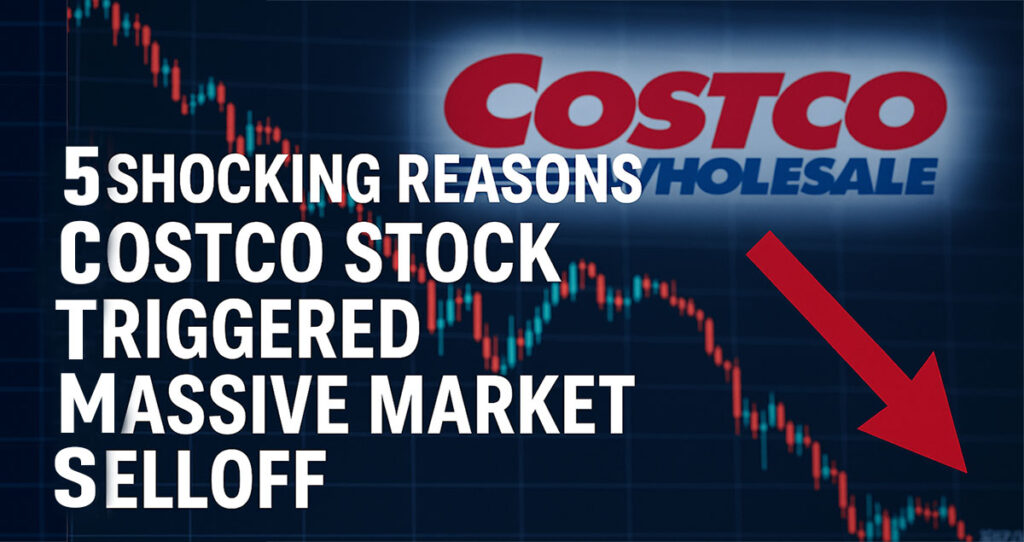Costco’s latest benefit report shocked Divider Road as the retail giant’s stock dropped 5.8% in after-hours trading. Despite 4.2% income development, same-store deals missed expectations by about 50%, rising as it were 1.7% versus the anticipated 3.5%. Consumer behavior is shifting dramatically toward essential items only, with electronics purchases down 6.8% while necessities increased 4.3%. This signals broader economic trouble as even value-conscious shoppers at America’s most successful warehouse retailer are cutting back on spending.
Understanding Costco’s Financial Performance and Market Impact
The Costco stock price today sent ripples throughout the financial markets when the warehouse retail giant released its Q2 2025 earnings report. What seemed like positive news on the surface quickly revealed concerning underlying trends that have investors and economists worried about the broader economic landscape.

Costco Wholesale stock has long been considered a bellwether for consumer spending habits across America. With over 850 locations worldwide and 591 stores in the United States alone, the company has built its reputation on providing bulk products at competitive prices through its legendary membership program that boasts an impressive 93% renewal rate.
Breaking Down Costco’s Q2 2025 Financial Results
The Costco stock analysis reveals a complex picture that goes beyond simple revenue numbers. While the company reported a 4.2% year-over-year revenue increase, which initially appeared positive, deeper examination shows troubling signs that have caused Costco shares to tumble in after-hours trading.
| Financial Metric | Q2 2025 Performance | Previous Year | Analyst Expectation | Variance |
| Total Revenue Growth | +4.2% YoY | Baseline | Not specified | Beat |
| Same-Store Sales Growth | +1.7% | Higher | +3.5% | -1.8% Miss |
| Stock Price Movement | -5.8% (After Hours) | Stable | Positive | Major Decline |
| Foot Traffic Change | -2.3% | +Growth | Positive | First decline in 4 years |
| Executive Membership Renewal | 90% | 92% | Maintain | -2% decline |
The most disturbing perspective of these comes about isn’t what they appear approximately Costco, particularly, but what they reveal about American shopper behavior amid these challenging financial times. The Costco stock promotion execution reflects a broader float that quick budgetary pros require to get and arrange for.
Consumer Spending Patterns Reveal Economic Stress
The Shift Toward Essential-Only Purchasing
Costco stock news today highlighted a dramatic shift in consumer purchasing behavior that extends far beyond typical seasonal fluctuations. The company’s CFO explicitly stated during the earnings call that customers are increasingly gravitating toward essential items while showing unprecedented price sensitivity, even within Costco’s already value-oriented business model.
Category Performance Breakdown:
- Electronics and Big-Ticket Items: Decreased by 6.8%
- Basic Necessities (Food, Household Consumables): Increased by 4.3%
- Discretionary Purchases: Sharp decline across all income brackets
- Shopping Cart Sizes: Consistently decreasing over the quarter
This shift represents more than just changing preferences; it signals genuine economic distress among American families. When consumers at Costco—a retailer specifically designed for value-conscious shoppers—begin cutting back on non-essential purchases, it indicates that inflationary pressures have reached a tipping point.
Membership Model Under Pressure
The Costco Discount Corporation’s stock performance reflects concerns approximately the maintainability of the company’s core commerce demonstrate. Costco works on razor-thin item edges, with roughly 75% of its working pay coming from enrollment expenses or maybe than item deals.
Membership Statistics That Matter:
- Overall Renewal Rate: Still strong at 93%
- Executive Membership Renewals: Dropped to 90% (down 2 percentage points year-over-year)
- New Membership Growth: Slowing compared to previous quarters
- Consumer Perception: 72% now view warehouse memberships as an economic necessity rather than a convenience
The two-percentage-point decline in executive membership renewals might seem small, but it represents thousands of customers reassessing their spending priorities. These are typically Costco’s most loyal and highest-spending customers, making this trend particularly concerning for future revenue projections.
Broader Economic Indicators Point to Recession
Corporate Layoffs Accelerating Across Industries
The challenges facing Costco stock today are part of a much larger economic pattern. Major corporations across multiple sectors are announcing significant workforce reductions, creating a ripple effect that will impact consumer spending for months to come.

Recent Major Layoff Announcements:
| Company | Employees Cut | Percentage of Workforce | Industry Sector |
| Intel | 15,000 | 15% | Technology |
| Goldman Sachs | 3,200 | 6.5% | Financial Services |
| Hasbro | 1,000 | 15% | Consumer Goods |
| Best Buy | 3,500 | Not specified | Retail |
| Gap Inc. | 400 | Corporate only | Retail |
These cutbacks make a horrendous cycle: as individuals lose jobs or fear losing employment, they decrease investing, which harms retailers like Costco, which at that point may be forced to cut costs themselves, possibly including workforce reductions.
Retail Industry Consolidation Continues
The struggles reflected in Costco stock price analysis are mirrored across the retail landscape. Even established brands with decades of market presence are closing locations and retreating from major markets.
Bed Bath & Beyond provides a stark example of retail challenges. After emerging from bankruptcy under new ownership, the company announced another 45 store closures nationwide. Once boasting over 1,500 areas, they presently work less than 350 stores, primarily in major metropolitan regions. The company was acquired by Overstock for a fair $21.5 million—a division of its previous value.
Walgreens reported plans to near 1,200 stores over the following three a long time, speaking to a noteworthy scaling down of one of America’s biggest drugstore chains. This hardening reflects changing buyer behaviors and the advancing weight of online retailers.
Consumer Confidence Hits Multi-Year Lows
The Costco stock market performance aligns with broader consumer sentiment indicators that paint a concerning picture of economic confidence:
Consumer Confidence Metrics:
- Consumer Confidence Index: Three consecutive months of decline
- Monthly Decline Rate: Largest since August 2021
- Future Spending Plans: 68% plan to reduce discretionary spending
- Economic Outlook: Pessimistic about future business conditions
- Income Expectations: Less optimistic about future earnings
Housing Market Sentiment:
- NAHB Wells Fargo Housing Market Index: Fell from 51 to 35 in six months
- Expected Home Sales: Declining for the next 3-6 months
- Price Expectations: Anticipated reductions
- Buyer Qualification Concerns: High interest rate environment impact
Understanding Costco’s Business Model Resilience
Value Proposition in Economic Downturns
Despite the challenges reflected in Costco Wholesale’s stock performance, the company maintains a few competitive advantages that have verifiably made a difference in the climate of financial storms. Understanding these qualities gives insight into both the company’s prospects and the seriousness of current financial conditions.

Costco’s Strategic Advantages:
- Membership Pricing: Basic Gold Star membership at $60 annually
- Executive Membership Value: $120 annual fee with 2% cashback rewards
- Kirkland Signature Brand: Consistently high-rated private label products
- Price Anchors: Maintained $1.50 hot dog combo and $4.99 rotisserie chicken despite inflation
The fact that even these value propositions aren’t enough to prevent customer pullback demonstrates the severity of current economic pressures on American families.
Costco’s Response to Economic Pressure
Costco stock quote movements reflect the market’s assessment of management’s strategic responses to changing economic conditions. Unlike many retailers turning to promotional pricing and limited-time offers, Costco has maintained its everyday low pricing strategy.
Strategic Initiatives:
- Stock Up and Save Events: Replace traditional promotional strategies
- Bulk Item Discounts: Additional 20% savings on select products
- Value Anchor Maintenance: Keeping loss-leader prices on popular items
- Supply Chain Optimization: Maintaining competitive pricing through efficiency
Economic Forecast and Investment Implications
Short-Term Economic Outlook (3-6 Months)
The trends reflected in Costco’s stock price today suggest several near-term economic developments that investors should prepare for:
Expected Economic Developments:
- Continued Consumer Spending Reduction: More families will prioritize essential purchases only
- Additional Corporate Layoffs: Companies will continue reducing their workforce to maintain profitability
- Retail Sector Consolidation: Weaker retailers will close locations or exit markets entirely
- Inflation Persistence: Cost-of-living pressures will continue affecting spending patterns
Investment Market Implications:
- Value Retailer Outperformance: Companies like Costco may outperform despite challenges
- Consumer Discretionary Weakness: Non-essential retailers are likely to struggle
- Defensive Sector Strength: Utilities, healthcare, and consumer staples may perform better
- Market Volatility: Earnings reports are likely to produce significant price movements
Medium-Term Considerations (6-18 Months)
Costco stock analysis suggests several medium-term trends that could reshape the retail landscape and broader economy:
Structural Economic Changes:
- Permanent Behavior Shifts: Consumer spending patterns may not return to pre-inflation levels
- Retail Format Evolution: Warehouse clubs and discount retailers may gain permanent market share
- Supply Chain Restructuring: Companies will prioritize efficiency over growth
- Labor Market Rebalancing: Service sector employment may remain below historical levels
Investment Strategy Adjustments:
- Quality Over Growth: Focus on companies with sustainable business models
- Dividend Reliability: Prioritize companies with strong cash flow and dividend history
- International Diversification: Consider exposure to less inflation-affected markets
- Real Asset Allocation: Include inflation-protected securities and commodities
Long-Term Economic Reset (2-5 Years)
The challenges facing Costco Wholesale Corporation stock and the broader economy may necessitate a fundamental economic reset that could take several years to complete.
Potential Long-Term Outcomes:
- New Consumer Normal: Permanently changed spending priorities and habits
- Retail Industry Restructuring: Significant consolidation and format changes
- Employment Market Evolution: Different skill requirements and wage structures
- Monetary Policy Adjustments: Federal Reserve policy changes to address persistent inflation
Investment Strategy Recommendations
Defensive Portfolio Positioning
Given the economic warning signs reflected in Costco stock value and broader market indicators, investors should consider defensive positioning strategies:

Core Defensive Strategies:
1. Debt Elimination Priority
- High-Interest Debt: Credit cards and personal loans priority
- Variable Rate Obligations: Address floating rate debt before fixed
- Mortgage Considerations: Evaluate refinancing opportunities if available
- Business Debt: Reduce leverage in the uncertain economic environment
2. Emergency Fund Enhancement
- Target Amount: 6-12 months of essential expenses
- Liquid Resources: High-yield reserve funds accounts and cash showcase stores
- Accessibility: Ensure funds are available without penalties
- Currency Considerations: Dollar-denominated accounts for stability
3. Investment Diversification
- Asset Class Spread: Stocks, bonds, real estate, commodities
- Geographic Distribution: Domestic and international exposure
- Sector Allocation: Balance growth and defensive sectors
- Time Horizon Matching: Align investments with spending needs
Specific Asset Allocation Recommendations
Conservative Portfolio (Risk-Averse Investors):
- 40% Fixed Income: Government and high-grade corporate bonds
- 30% Large-Cap Value Stocks: Including companies like Costco
- 15% International Developed Markets: Diversification benefits
- 10% Real Estate Investment Trusts: Inflation protection
- 5% Precious Metals: Gold and silver allocation
Moderate Portfolio (Balanced Approach):
- 30% Fixed Income: Mix of government and corporate bonds
- 35% Domestic Equities: Value and growth balance
- 20% International Stocks: Developed and emerging markets
- 10% Alternative Investments: REITs, commodities, infrastructure
- 5% Cash and Equivalents: Opportunistic positioning
Growth-Oriented Portfolio (Long-Term Focused):
- 20% Fixed Income: High-yield and international bonds
- 45% Equity Investments: Growth and value stocks
- 25% International Exposure: Global diversification
- 7% Alternative Assets: Real estate and commodities
- 3% Speculative Investments: Emerging technologies and sectors
Understanding Market Psychology and Investor Behavior
Stock Market Response to Economic Stress
The Costco stock advertisement response to profit comes about illustrates how speculator brain research influences advertising estimation during dubious financial periods. Understanding this flow makes a difference; speculators make superior choices.
Market Psychology Factors:
- Earnings Expectation Sensitivity: Small misses create large price movements
- Forward-Looking Concerns: Markets price in future economic deterioration
- Risk Premium Increases: Investors demand higher returns for uncertainty
- Liquidity Preference: Flight to quality during stress periods
Layoff Announcement Paradox
Interests, when companies report cutbacks, their stock costs regularly increase since speculators see fetched diminishment as positive for profit. Best Buy’s stock rose 3.2% taking after their cutback announcement, illustrating this outlandish showcase reaction.
Consumer Behavior Analysis
The changes in consumer spending patterns revealed by Costco’s stock performance today provide insights into broader economic psychology:
Spending Priority Hierarchy During Economic Stress:
- Essential Food Items: Maintained or increased spending
- Healthcare and Medications: Protected from cuts
- Housing and Utilities: Reduced where possible, but maintained
- Transportation: Optimized for efficiency
- Entertainment and Discretionary: First items eliminated from budgets
Psychological Factors Affecting Spending:
- Loss Aversion: People feel losses more acutely than equivalent gains
- Uncertainty Avoidance: Preference for known outcomes over risky choices
- Social Proof: Following others’ behavior during uncertain times
- Mental Accounting: Treating different money sources differently
Industry-Specific Analysis and Implications
Warehouse Club Retail Sector
Costco Wholesale’s stock execution influences the whole distribution center club retail division, which incorporates competitors like Sam’s Club (Walmart) and BJ’s Discount Club.

Sector Competitive Dynamics:
- Market Share Competition: Economic stress may benefit warehouse clubs
- Membership Fee Sensitivity: Pressure on renewal rates across all players
- Supplier Negotiations: Increased importance of cost management
- Real Estate Strategy: Location optimization becomes critical
Sector Investment Considerations:
- Market Leader Advantage: Costco’s scale and efficiency benefits
- Private Label Success: Kirkland Signature brand strength
- International Expansion: Growth opportunities in developing markets
- Technology Integration: E-commerce and digital membership benefits
Broader Retail Industry Impact
The challenges facing Costco stock price analysis extend throughout the retail industry, creating both risks and opportunities:
Traditional Retail Challenges:
- Department Stores: Continued pressure from changing shopping habits
- Specialty Retail: Difficulty maintaining foot traffic and margins
- Shopping Centers: Vacancy rates and rental income pressure
- Luxury Retail: Potential recession impact on high-end spending
Retail Sector Opportunities:
- Value Retailers: Market share gains during economic stress
- Essential Services: Grocery, pharmacy, and healthcare retail resilience
- E-commerce Integration: Omnichannel strategies become essential
- Private Label Growth: Store brands gain market share
Global Economic Context and International Implications
International Market Considerations
Costco stock performance occurs within a global economic context that affects both the company’s international operations and broader investment implications:
Global Economic Factors:
- Currency Exchange Rates: Impact on International Revenue Translation
- Supply Chain Disruptions: Continued effects from the pandemic and geopolitical tensions
- International Inflation: Varied inflation rates across different markets
- Trade Policy Changes: Tariffs and trade agreements affecting costs
Regional Market Analysis:
- North American Operations: Core market showing stress signals
- Asian Markets: Growth opportunities but economic uncertainties
- European Presence: Limited, but with potential expansion markets
- Emerging Markets: Long-term growth potential with higher risks
Comparative International Retail Performance
Understanding how Costco Wholesale Corporation stock compares to international retail chains provides context for global economic conditions:
International Retail Comparison:
- European Warehouse Clubs: Metro AG and similar concepts
- Asian Retail Giants: Alibaba, JD.com performance indicators
- Latin American Retailers: Economic stress indicators in developing markets
- Currency Impact Analysis: Exchange rate effects on earnings
Technology and Innovation Impact on Retail
Digital Transformation in Warehouse Retail
Costco stock news today must be understood within the context of ongoing technological changes affecting the retail industry:

Technology Integration Trends:
- E-commerce Platform Development: Online ordering and delivery services
- Mobile App Functionality: Digital membership and shopping features
- Inventory Management Systems: AI and automation in supply chain
- Customer Data Analytics: Personalization and targeted marketing
Digital Strategy Implications:
- Investment Requirements: Technology upgrades require significant capital
- Competitive Pressure: Amazon and other digital-first retailers
- Customer Expectations: Seamless omnichannel experiences
- Operational Efficiency: Technology-driven cost reduction opportunities
Future Retail Innovation
The challenges reflected in Costco’s share price performance may accelerate innovation in retail technology and business models:
Emerging Retail Technologies:
- Autonomous Conveyance Frameworks: Rambles and self-driving vehicles
- Augmented Reality Shopping: Virtual item showings
- Artificial Intelligence: Personalized shopping recommendations
- Blockchain Supply Chain: Transparency and authenticity verification
Environmental and Social Considerations
Sustainability Impact on Retail Operations
Costco stock value increasingly reflects environmental, social, and governance (ESG) considerations that affect long-term business sustainability:
Environmental Factors:
- Sustainable Packaging: Reduction in plastic and waste
- Vitality Productivity: Sun-based establishments and Driven lighting
- Supply Chain Maintainability: Mindful Sourcing Practices
- Transportation Optimization: Decreased carbon footprint in coordination
Social Responsibility Considerations:
- Employee Treatment: Wages and benefits above industry average
- Community Impact: Local economic development and charity
- Product Safety: Quality control and recall procedures
- Diversity and Inclusion: Workplace and supplier diversity programs
ESG Investment Implications
Modern investors increasingly consider ESG factors when evaluating Costco Wholesale stock and other retail investments:
ESG Investment Criteria:
- Environmental Performance: Carbon footprint and sustainability metrics
- Social Impact: Employee satisfaction and community relations
- Governance Quality: Board composition and executive compensation
- Stakeholder Relations: Customer, supplier, and investor treatment
Practical Investment Action Steps
Immediate Actions for Investors
Based on the warning signs revealed by Costco’s stock performance today, investors should consider taking specific immediate actions:

Week 1-2 Action Items:
- Portfolio Review: Assess current allocation and risk exposure
- Debt Assessment: Evaluate and prioritize debt reduction opportunities
- Emergency Fund Status: Calculate current fund adequacy
- Insurance Review: Ensure adequate coverage for economic uncertainties
Month 1 Action Items:
- Rebalancing: Adjust portfolio allocation based on the new economic outlook
- Dividend Stock Research: Identify reliable income-producing investments
- Real Estate Evaluation: Assess property values and rental income potential
- Tax Strategy Planning: Optimize tax efficiency for the new economic environment
Long-Term Strategic Planning
Costco stock analysis suggests the need for comprehensive long-term financial planning adjustments:
Strategic Planning Components:
- Retirement Timeline Adjustment: Consider the economic impact on retirement plans
- Education Funding: Reassess college savings strategies
- Healthcare Planning: Prepare for potential insurance and cost changes
- Estate Planning: Update wills and beneficiary designations
Investment Philosophy Refinement:
- Risk Tolerance Reassessment: Honest evaluation of risk capacity
- Time Horizon Adjustment: Match investments to realistic timelines
- Diversification Enhancement: Expand beyond traditional asset classes
- Income Generation Focus: Prioritize cash flow over pure growth
Conclusion and Key Takeaways
The Costco stock cost today’s decrease nowadays speaks to more than a fair one company’s quarterly disappointment—it serves as a basic financial indicator demonstrating crucial shifts in American buyer behavior and broader financial conditions. The reality that Costco, with its value-oriented commerce and faithful client base, is encountering these challenges suggests that financial weights have come to a tipping point.
Critical Warning Signs:
- Value Retailer Stress: Even the most efficient retailers are facing customer pullback
- Consumer Behavior Permanence: Spending pattern changes may be lasting
- Membership Model Pressure: First signs of weakness in subscription-based retail
- Economic Momentum: Downward trajectory gaining speed across multiple indicators
Key Investment Implications:
- Defensive Positioning: Prioritize capital preservation over growth
- Quality Center: Contribute to companies with solid commerce models and adjust sheets
- Diversification Importance: Spread risk across asset classes and geographies
- Income Generation: Emphasize dividend-paying stocks and income-producing assets
Action-Oriented Recommendations:
- Debt Reduction: Eliminate high-interest obligations immediately
- Emergency Fund Building: Increase cash reserves for economic uncertainty
- Portfolio Rebalancing: Adjust allocation toward defensive investments
- Continuous Monitoring: Stay informed about economic developments and adjust accordingly
The financial scene is moving quickly, and the caution signs are getting to be progressively clear. Keen financial specialists will notice these signals and position their portfolios protectively, whereas remaining deft for potential advertise separations that make long-term investment opportunities.
Remember that effective contributing amid questionable times requires tolerance, teach, and a clear understanding of both dangers and opportunities. The challenges confronting Costco Discount Organization stock and the broader economy make both immediate concerns and potential future opportunities for well-prepared speculators.







799pakgameapk? Man, if you’re hunting for game APKs, this place is worth a look. Found some cool stuff there. Just be careful and always scan those files! 799pakgameapk
Alright, folks, let’s talk TP88Casino. I gave it a whirl and honestly, it’s not bad! The games are pretty slick and I had a decent time. Check it out and see what you think! tp88casino
Win88blueslot, I played some slots and it was a pretty average experience. Good layout and games. If you like slots, give it a try: win88blueslot